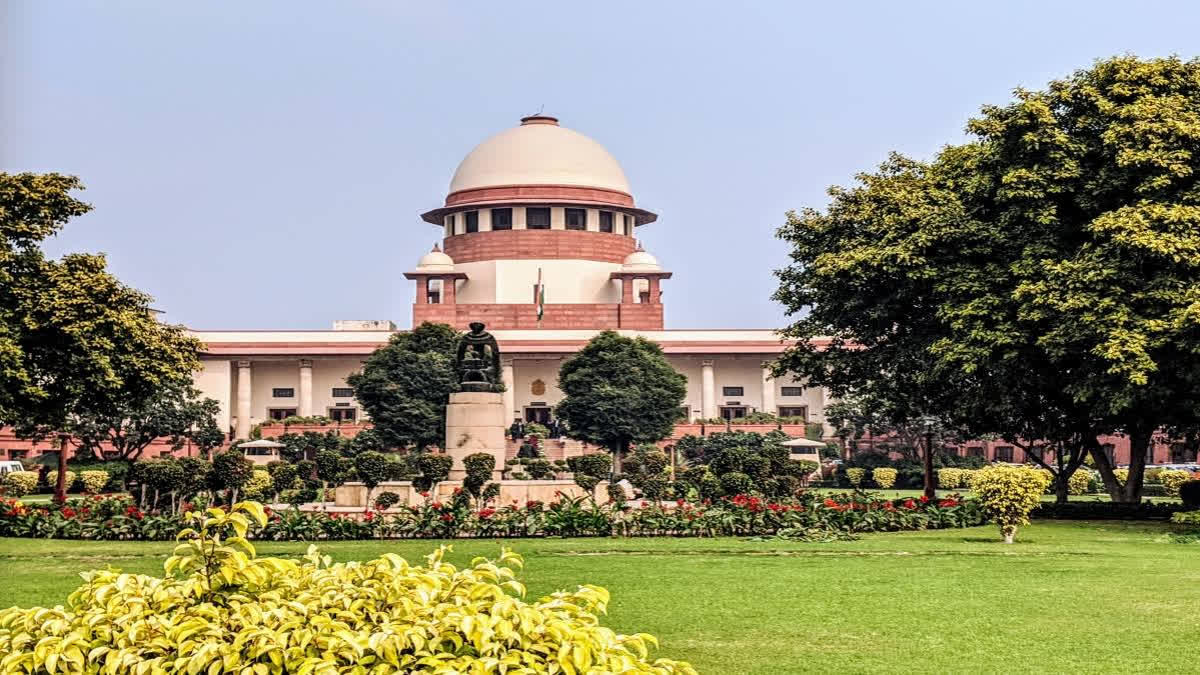New Delhi: The power of the states to regulate industrial alcohol is plenary and cannot be trampled by the Centre, the Uttar Pradesh government told the Supreme Court on Thursday while emphasising that the term "intoxicating liquor" should be given a wider meaning to include industrial alcohol and should be brought within the ambit of the states' law-making power.
Senior advocate Dinesh Dwivedi, appearing in the court on behalf of the Uttar Pradesh government, told a nine-judge Constitution bench headed by Chief Justice D Y Chandrachud that all liquids containing alcohol come within the ambit of "intoxicating liquor".
"The legislative history clearly shows that the words 'intoxicating liquor' are wide enough to include industrial alcohol and all the liquids consisting of alcohol.
"The word 'intoxicating' can mean both (a) capable of causing intoxication or has the potentiality for it and (b) causes intoxication when had as it is, namely as beverage. Both the aspects should fall under Entry 8 to include 'all liquids containing alcohols'," Dwivedi told the bench, which reserved its verdict in the matter after hearing the submissions for six days.
The bench, also comprising Justices Hrishikesh Roy, Abhay S Oka, B V Nagarathna, J B Pardiwala, Manoj Misra, Ujjal Bhuyan, Satish Chandra Sharma and Augustine George Masih, heard arguments from Attorney General R Venkataramani, Solicitor General Tushar Mehta, senior advocates Dwivedi and Arvind P Datar, who appeared in the court on behalf of the Uttar Pradesh government, and other lawyers representing different states.
Industrial alcohol is not meant for human consumption. While Entry 8 in the State List under the 7th Schedule of the Constitution gives the states the power to legislate on the manufacture, possession, transport, purchase and sale of "intoxicating liquors", Entry 52 of the Union List and Entry 33 of the Concurrent List mention industries whose control is "declared by Parliament by law to be expedient in public interest".
While both Parliament and state legislatures can enact laws on the subjects mentioned in the Concurrent List, a central law will have primacy over the state law.
A clutch of petitions came before the nine-judge bench after a seven-judge Constitution bench ruled against the states. The matter was referred to the nine-judge bench in 2010 after the seven-judge bench ruled in 1997 that the Centre would have regulatory power over the production of industrial alcohol.
The seven-judge bench had, in 1990, observed that through the Industries (Development and Regulation) Act, 1951, the Union had "evinced a clear intention to occupy" legislative competence on the subject and hence, Entry 33 could not empower a state government.
The top court had earlier asked the Centre why the states, as the custodians of the health of citizens, cannot impose regulations on industrial alcohol and levy fees to ensure that its abuse does not take place.
Commencing his arguments before the nine-judge bench, Mehta had earlier said the court's interpretation would not impact just industrial alcohol (the only subject argued by the petitioners) but every industry included in Schedule 1 of the Industries (Development and Regulation) Act, 1951.
The hearing remained inconclusive and will resume on April 16. The Centre had earlier told the apex court that the legislative power to levy excise duty on alcohol not fit for human consumption but meant for industrial use lies exclusively with Parliament.
Venkataramani had submitted that a "conscious decision" was taken to treat alcoholic liquors fit for human consumption and alcoholic liquors not fit for human consumption separately, with the former falling within the domain of provincial legislatures and the latter within the ambit of the federal legislature.
Prior to that, Bharatiya Janata Party-ruled Uttar Pradesh and Trinamool Congress-governed West Bengal were on the same page in the top court, where they asserted that the legislative power vested in the states to regulate industrial alcohol is untrammelled and complete and beyond the Centre's jurisdiction.



